 EN
EN
 PT
PT
Pedagogical weaving of the Montessorian school and non-traditional teaching
Product: Book
Trim size in cm: 17x24
Pages: 191
ISBN: 9788859016427
Publication date: 01/09/2018
REQUEST A SAMPLE OR MORE INFORMATION
What if Maria Montessori had lived through the decades between her death and today? She would have most likely met don Milani, Mario Lodi, Rodari, Bortolato, Malaguzzi, Rosenberg, Forest Pedagogy, Cooperative learning, Diffused education and Schools Without Bags. And vice versa, how many of these experiences would not be what they are today without Maria Montessori? This book presents a pedagogical dictionary of encounters and key themes, evident and attractive pedagogical fraternities, articulated in ten different dialogues. These are encounters that Montessori never actually personally experienced but that we can try to imagine, transforming them not only into educational and teaching reflections but also into everyday practice. Achievable paths of learning and development, practical tips showing how pedagogical encounters can be expressed in teaching, entrusted to the professionalism of teachers, who, enthusiastic about the Montessori method, have the will and ability to bring it to life in the present and are not afraid that contamination might mean distorting the essence and value of the method.
Introduction
PART ONE Montessori meets… other maestros
CHAP. 1 Montessori meets Gianni Rodari: the necessary mistake
CHAP. 2 Montessori meets Mario Lodi: the school like the home, trust and listening as a practice
CHAP. 3 Montessori meets Camillo Bortolato: the hand, a sensory and analogical tool
PART TWO Montessori meets… other schools
CHAP. 4 Montessori meets the Reggio Emilia Approach and Reggio Children: observation as a gesture of care
CHAP. 5 Montessori meets forest pedagogy: learning and growing independently
CHAP. 6 Montessori meets Paolo Mottana and diffused education: a dialogue between cosmic and political vision for the time of adolescence

The educational «method» developed by Maria Montessori (1870-1952), the famous Italian pedagogist has inspired numerous scholastic realities all over the world. Erickson offers a series of volumes dedicated to the Montessori pedagogic model, for acquainting oneself with the theoretical principles on which the method is based and for reflecting on its practical application in the contemporary context.
All of Erickson's publications on the Montessori Method
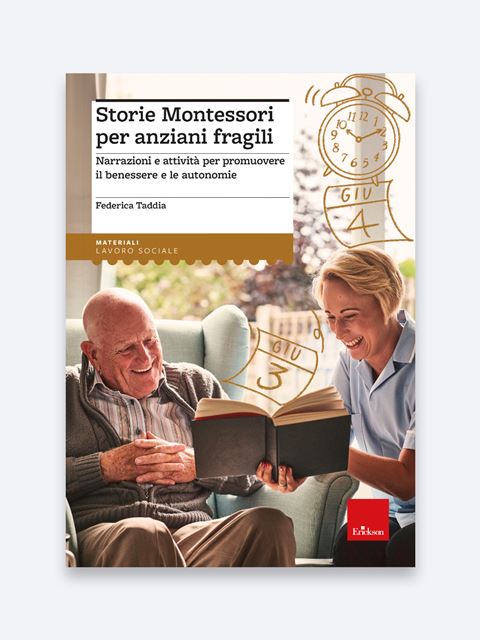
MONTESSORI STORIES FOR FRAIL ELDERLY PEOPLE Narration and activities to promote well-being and autonomy
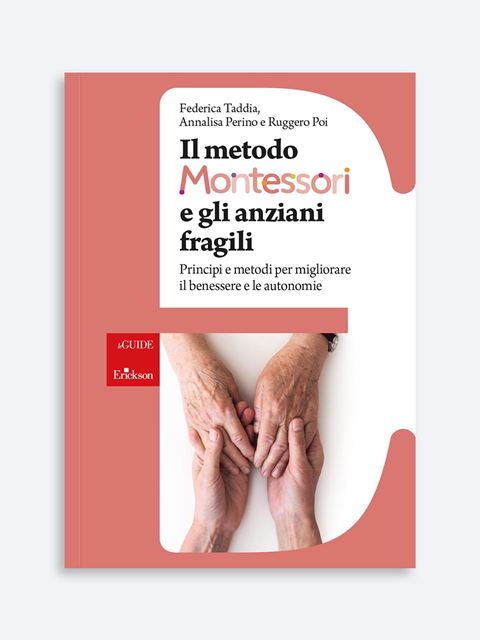
THE MONTESSORI METHOD AND THE FRAIL ELDERLY Principles and methods for improving well-being and autonomy
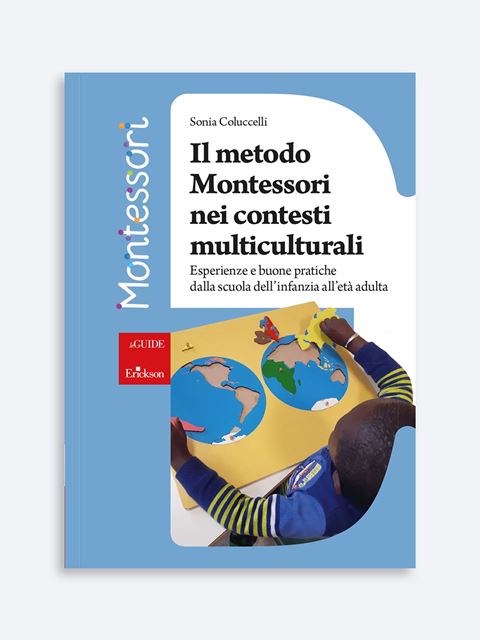
THE MONTESSORI METHOD IN MULTI-CULTURAL CONTEXTS Experiences and good practices from kindergarten to adulthood
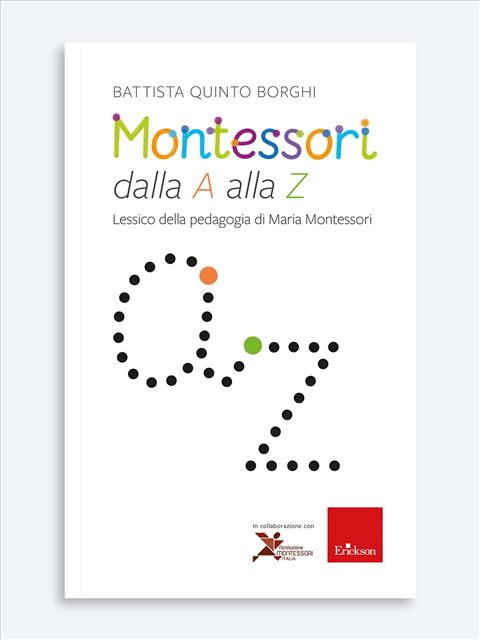
MONTESSORI FROM A TO Z Pedagogist Maria Montessori’s lexicon
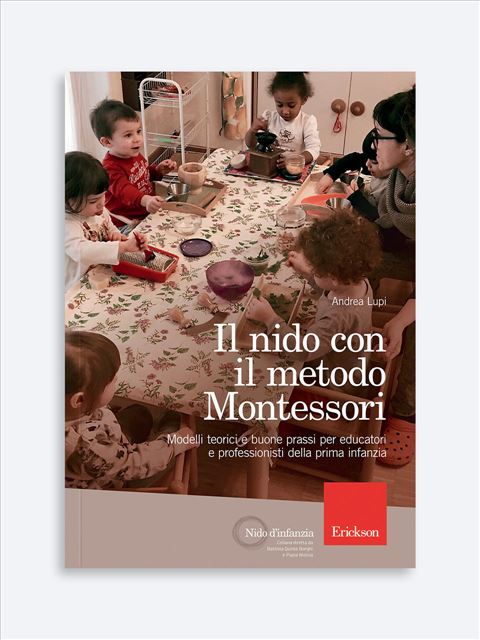
NURSERY SCHOOL WITH THE MONTESSORI METHOD Theoretical models and best practices for early childhood educators and professionals
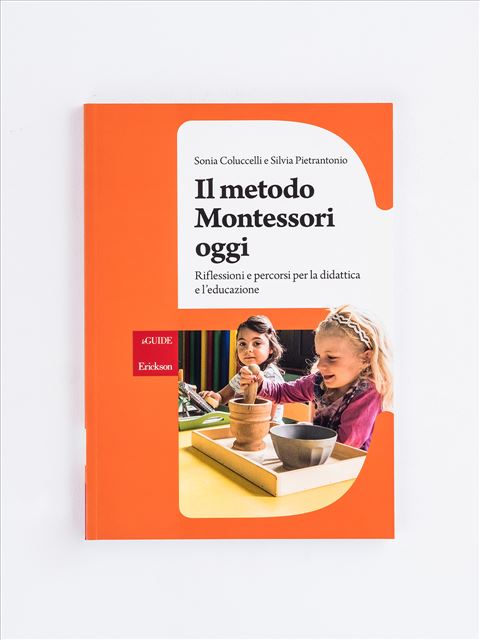
THE MONTESSORI METHOD TODAY Reflections and paths for teaching and education
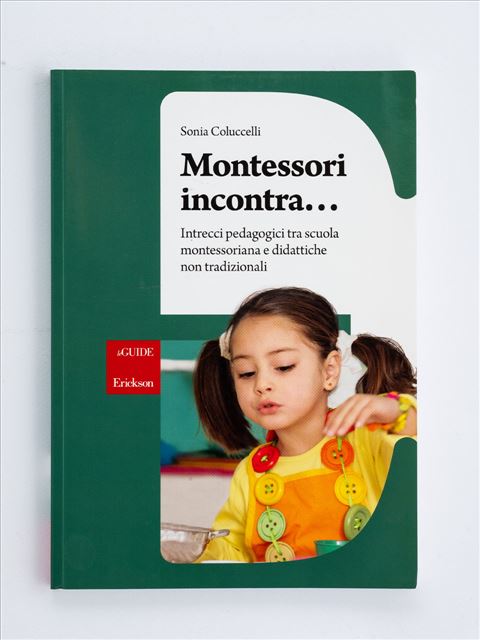
MONTESSORI MEETS… Pedagogical weaving of the Montessorian school and non-traditional teaching
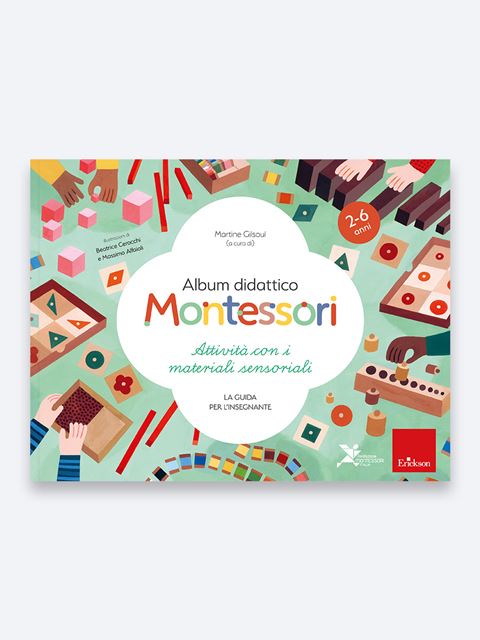
MONTESSORI’S EDUCATIONAL ALBUM FOR TEACHERS A complete functional guide for getting to know and use the Montessori method in class.
MONTESSORI STORIES FOR FRAIL ELDERLY PEOPLE
Narration and activities to promote well-being and autonomy
by Federica Taddia
AUDIENCE Montessori stories for frail elderly people is aimed at educators, health care workers, and all assistance professionals.
AUTHOR Federica Taddia is an expert in the pedagogy of the elderly, a trainer in the health and social field and an adjunct professor at the University of Bologna, where she conducts laboratories on non-drug therapies.
THE MONTESSORI METHOD AND THE FRAIL ELDERLY
Principles and methods for improving well-being and autonomy
by Federica Taddia, Annalisa Perino, Ruggero Poi
Thanks to the contributions of specialists, this volume explores the Montessori method applied to frail elderly people, proposing numerous examples of activities that can be easily set up in different contexts (in CRAs, Day Centers, in hospitals or at home).
The volume is divided into 3 parts:
AUDIENCE The Montessori method and the frail elderly is aimed at educators, health care workers, and all assistance professionals.
AUTHORS Federica Taddia is an expert in the pedagogy of the elderly, a trainer in the health and social field and an adjunct professor at the University of Bologna, where she conducts laboratories on non-drug therapies. Annalisa Perino is an educator and director of training courses in the Montessori method. Since 2013 she has started experimenting with the Montessori method in contexts of frailty of the elderly. Ruggero Poi is a Montessori trainer and director of training courses in the Montessori method. He was executive vice president of the Montessori Italy Foundation and directs the Learning Environments Office of Cittadellarte - Pistoletto Foundation.
The Montessori method in multi-cultural contexts
Experiences and good practices from kindergarten to adulthood
by Sonia Coluccelli
A book for reasoning about how the Montessori method can be applied successfully in multi-ethnic classes, from nursery to primary school, and in the teaching of a foreign language as an L2 for adults with very distant linguistic backgrounds, including cases of illiteracy.
This volume is divided into 5 chapters:
AUDIENCE The Montessori method in multi-cultural contexts is aimed at teachers working at Montessori method schools, and traditional schools, cultural mediators, inclusion association and institution workers.
AUTHOR Sonia Coluccelli is a graduate in Philosophy. She is a Montessori method primary school teacher and she also trains teachers and parents in various contexts and within programmes offered by the Fondazione Montessori Italia (Montessori Foundation Italy). Since 2013, she has coordinated the Rete scuole Montessori Alto Piemonte (Upper Piedmont Montessori School Network). She supports and supervises the setting up of new Montessori method divisions in various locations in Central-Northern Italy.
MONTESSORI FROM A TO Z
Pedagogist Maria Montessori's lexicon
by Battista Quinto Borghi
In collaboration with the Fondazione Montessori Italia (Montessori Foundation Italy; www.fondazionemontessori.it), the book Montessori from A to Z was created with the aim of offering everyone, even non-expert readers of Montessori education, the possibility of better understanding the thought and educational activities of Maria Montessori.
The volume is organized in three parts:
AUDIENCE Montessori from A to Z is aimed at teachers, parents, educators and all those who are interested in getting to know and understand Maria Montessori’s school of thought, and also serves as preparation for the direct reading of her works.
AUTHOR Battista Quinto Borghi is Pedagogical Director of Services for Childhood in the city of Turin and a lecturer at the Free University of Bozen-Bolzano. With extensive experience of training behind him, he has published ten books as well as a number of papers in journals and essays. He is President of the Fondazione Montessori Italia (Montessori Foundation Italy).
NURSERY SCHOOL WITH THE MONTESSORI METHOD
Theoretical models and best practices for early childhood educators and professionals
by Andrea Lupi
A book focused on the Montessori method nursery, compared to a traditional pre-school which is aimed at identifying the historical, cultural and pedagogical roots that the two types of services share.
The book is organized in three chapters:
AUDIENCE Nursery school with the Montessori method is aimed at teachers, parents, and educators of nursery school children who want to create a Montessori method nursery, or simply deepen their understanding of the methods and practices implemented within it.
AUTHOR Andrea Lupi is a pedagogist and trainer, supervisor of method structures, expert in designing educational material for nursery and primary schools. He is Secretary General of the Fondazione Montessori Italia (Montessori Foundation Italy).
THE MONTESSORI METHOD TODAY
Reflections and paths for teaching and education
by Sonia Coluccelli and Silvia Pietrantonio
The Montessori method today offers a reflection on how the Montessori method can become a common good and not a rarity accessible only to a chosen few, with the aim of seeing the method accepted not only by those who study and practice the educational thought and practices of Maria Montessori, but by all those who, in one guise or another, approach the difficult and exciting task of educating children.
The volume is divided into three parts:
AUDIENCE The Montessori method today is aimed at educators who already work in a Montessori context, as well as those who are just starting out.
AUTHORS Sonia Coluccelli is a graduate in Philosophy. She is a Montessori method primary school teacher and she also trains teachers and parents in various contexts and within programmes offered by the Fondazione Montessori Italia (Montessori Foundation Italy). Since 2013, she has coordinated the Rete scuole Montessori Alto Piemonte (Upper Piedmont Montessori School Network). She supports and supervises the setting up of new Montessori method divisions in various locations in Central-Northern Italy. Silvia Pietrantonio has a degree in International and Diplomatic Sciences, a master of arts in Contemporary European Studies and a research doctorate in Contemporary History. She founded and is president of the Libera-Mente association in Trento, through which she contributed in bringing the Montessori method to Trentino for the first time, supervising a plurilingual Montessori educational experience for two years.
MONTESSORI MEETS...
Pedagogical weaving of the Montessorian school and non-traditional teaching
by Sonia Coluccelli
66 years after the death of Maria Montessori, Montessori meets ...presents ten meetings that the educator never experienced directly, but that can be transformed into educational and didactic reflection, as well as into practice.
The volume is organized in four parts:
AUDIENCE Montessori meets is aimed mainly at educators who are passionate about the Montessori method and have the desire and the ability to make it live in the present, without the fear that contamination could mean distorting the essence and value of the method itself
AUTHOR Sonia Coluccelli is a graduate in Philosophy. She is a Montessori method primary school teacher and she also trains teachers and parents in various contexts and within programmes offered by the Fondazione Montessori Italia (Montessori Foundation Italy). Since 2013, she has coordinated the Rete scuole Montessori Alto Piemonte (Upper Piedmont Montessori School Network). She supports and supervises the setting up of new Montessori method divisions in various locations in Central-Northern Italy.
Discover the Montessori’s Educational Album for Teachers A complete functional guide for getting to know and use the Montessori method in class.